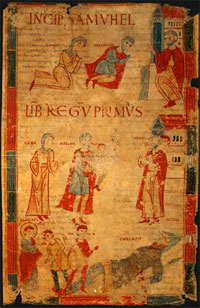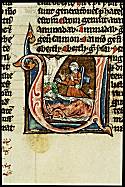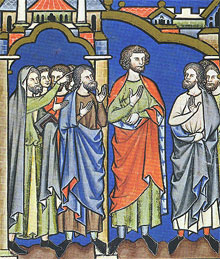From Our Archives
Three essays by Debie Thomas, What Do You See? (2021); Come and See (2018); and The Outsider Prophet (2015).
For Sunday January 14, 2024
Lectionary Readings (Revised Common Lectionary, Year B)
1 Samuel 3:1-10, (11-20)
Psalm 139:1-6, 13-18
1 Corinthians 6:12-20
John 1:43-51
This Week's Essay
One of the things that I love about the liturgy at my church is that we begin with the Collect for Purity. This prayer dates back to the 10th century, and entered the Anglican tradition when Thomas Cranmer translated it from Latin to English in 1549. For many readers, this prayer is deeply familiar and powerfully evocative. Here is the version from the 1979 Book of Common Prayer:
Almighty God, to you all hearts are open, all desires known, and from you no secrets are hid: Cleanse the thoughts of our hearts by the inspiration of your Holy Spirit, that we may perfectly love you, and worthily magnify your holy Name; through Christ our Lord. Amen.
 |
|
Four Scenes from the First Book of Samuel, late 11th century, miniature on vellum
|
The purpose of the "collect" is to summarize, focus, clarify and remind ourselves exactly what it is we hope to do in the service that follows. That includes many things, of course, but in my mind it is primarily a twofold declaration and celebration — that God is both mysteriously infinite and personally intimate, that the Holy God who knows me is my Heavenly Father who loves me.
At first glance, the Collect feels like a harsh exposure to guilt, fear, and shame — the terrifying realization that God knows all my distracted thoughts and disordered loves, my unruly desires and unwanted dreams. In fact, the exact opposite is true.
Instead of judgment, the Collect expresses the paradoxical combination of human confession that brings liberation, and divine comfort that brings consolation. In other words, I am both nakedly revealed before the infinite God, and lovingly sheltered by his intimate love.
Some of the psalms describe God as forgetful, ignorant, remote, deaf, and even asleep (Psalm 44:23). In 1 Samuel 3:1 this week, God is portrayed as speechless, as if he's unable or unwilling to talk: "in those days the word of the Lord was rare; there were not many visions." To be sure, these psalms articulate how we sometimes feel — the loneliness of abandonment in a silent world.
 |
|
God calls Samuel,
anonymous, Utrecht, c. 1430. |
But Psalm 139 for this week is different. It's a sort of Collect for Purity on steroids. Yes, God is infinite, but he is also "intimately acquainted with all my ways." Whether I feel it or not, whether I believe it or not, I'm always safe in the presence of God's Spirit: "If I go up to the heavens you are there; / if I make my bed in the depths, you are there." Instead of feeling like a demographic accident among eight billion people, every person can say, "you created my inmost being; / you knit me together in my mother's womb. / When I was woven together in the depths of the earth, / your eyes saw my unformed body."
We don't have to hide from God, or present a highly edited version of ourselves to him, which is both impossible and unnecessary. Psalm 139 reminds us that “we do not have a high priest who is unable to sympathize with our weaknesses, but we have one who has been tempted in every way, just as we are — yet was without sin. Let us then approach the throne of grace with confidence, so that we may receive mercy and find grace to help us in our time of need.” (Hebrews 4:15–16).
 |
|
God calls Samuel,
French, c. 1250. |
In his book Wishful Thinking, Frederick Buechner calls Psalm 139 "the secret prayer of us all." The psalm is about "hiding and baring our secrets," writes Buechner. In his own journey, that meant, among other things, discovering the healing presence of God even in his father's alcoholism and suicide, and in his daughter's severe struggle with anorexia.
When Buechner gave the Noble Lectures at Harvard in the winter of 1969, he articulated what became the hallmark of his life work — the conviction that if God speaks to us at all, it is in the everyday events of an ordinary life. The lectures became the book The Alphabet of Grace, in which he "set out to describe a single representative day of my life in a way to suggest what there was of God to hear in it." For Buechner, the "humdrum events of our lives," as he called them, are an alphabet through which God spells out his words and meaning to us.
In a much-quoted passage from his book Now and Then, he articulated how both his fiction and his four memoirs had the same goal:
 |
|
Samuel anoints Saul as King,
Maciejowski Bible (13th century illuminated manuscript). |
"By examining as closely and as candidly as I could the life that had come to seem to me in many ways a kind of trap or dead-end street, I discovered that it really wasn't that at all. I discovered that if you really keep your eye peeled to it and your ears open, if you really pay attention to it, even such a limited and limiting life as the one I was living on Rupert Mountain opened up onto extraordinary vistas. Taking your children to school and kissing your wife good-bye. Eating lunch with a friend. Trying to do a decent day's work. Hearing the rain patter against the window. There is no event so commonplace but that God is present within it, always hiddenly, always leaving you room to recognize him or not to recognize him, but all the more fascinatingly because of that, all the more compellingly and hauntingly. In writing those lectures and the book they later turned into, it came to seem to me that if I were called upon to state in a few words the essence of everything I was trying to say both as a novelist and as a preacher, it would be something like this: listen to your life. See it for the fathomless mystery that it is. In the boredom and pain of it no less than in the excitement and gladness: touch, taste, smell your way to the holy and hidden heart of it because in the last analysis all moments are key moments, and life itself is grace. What I started trying to do as a writer and as a preacher was more and more to draw on my own experience not just as a source of plot, character, illustration, but as a source of truth."
Like the poet in Psalm 139, listen to the mystery of your life. Pay attention. Be still and know that God is present. Before him, all hearts are open, all desires known, and from him no secrets are hidden. As Buechner put it in The Sacred Journey, "He says he is with us on our journeys. He says he has been with us since each of our journeys began. Listen for him. Listen to the sweet and bitter airs of your present and your past for the sound of him." Know with certainty that you are held fast by his love.
Weekly Prayer
1 You have searched me, Lord,
and you know me.
2 You know when I sit and when I rise;
you perceive my thoughts from afar.
3 You discern my going out and my lying down;
you are familiar with all my ways.
4 Before a word is on my tongue
you, Lord, know it completely.
5 You hem me in behind and before,
and you lay your hand upon me.
6 Such knowledge is too wonderful for me,
too lofty for me to attain.7 Where can I go from your Spirit?
Where can I flee from your presence?
8 If I go up to the heavens, you are there;
if I make my bed in the depths, you are there.
9 If I rise on the wings of the dawn,
if I settle on the far side of the sea,
10 even there your hand will guide me,
your right hand will hold me fast.
11 If I say, “Surely the darkness will hide me
and the light become night around me,”
12 even the darkness will not be dark to you;
the night will shine like the day,
for darkness is as light to you.13 For you created my inmost being;
you knit me together in my mother’s womb.
14 I praise you because I am fearfully and wonderfully made;
your works are wonderful,
I know that full well.
15 My frame was not hidden from you
when I was made in the secret place,
when I was woven together in the depths of the earth.
16 Your eyes saw my unformed body;
all the days ordained for me were written in your book
before one of them came to be.
17 How precious to me are your thoughts, God!
How vast is the sum of them!
18 Were I to count them,
they would outnumber the grains of sand—
when I awake, I am still with you.19 If only you, God, would slay the wicked!
Away from me, you who are bloodthirsty!
20 They speak of you with evil intent;
your adversaries misuse your name.
21 Do I not hate those who hate you, Lord,
and abhor those who are in rebellion against you?
22 I have nothing but hatred for them;
I count them my enemies.
23 Search me, God, and know my heart;
test me and know my anxious thoughts.
24 See if there is any offensive way in me,
and lead me in the way everlasting.
Dan Clendenin: dan@journeywithjesus.net
Image credits: (1) National Gallery of Art; (2) Biblical Art on the WWW; (3) Biblical Art on the WWW; and (4) www.medievaltymes.com.





